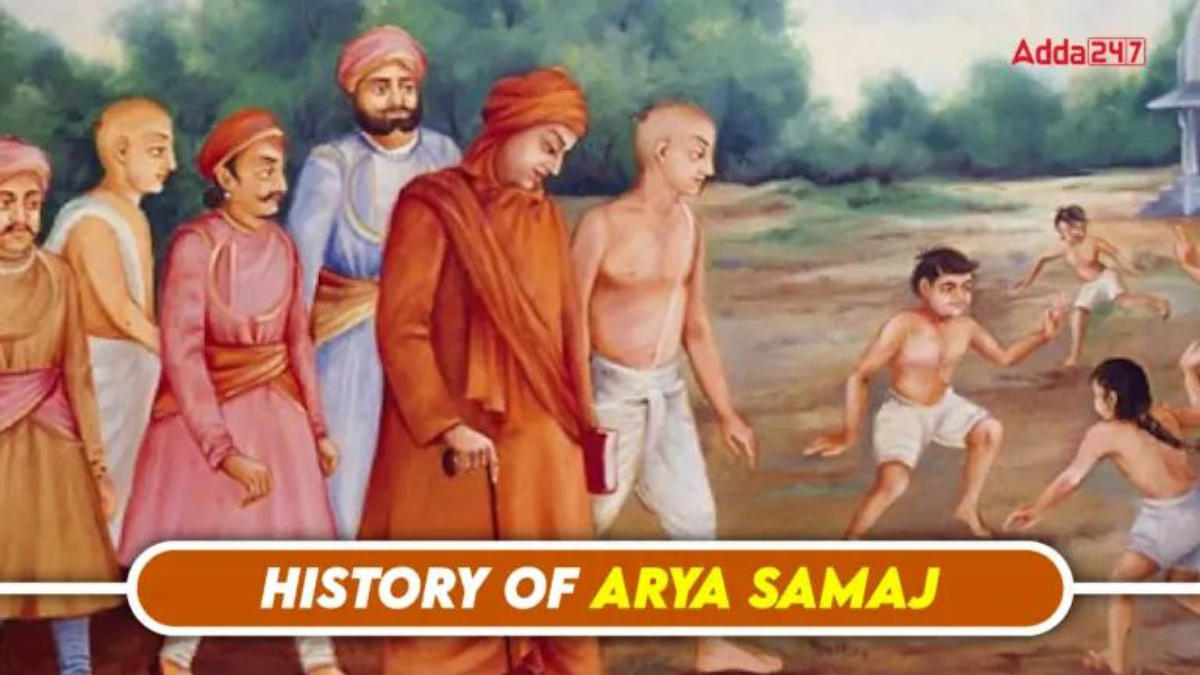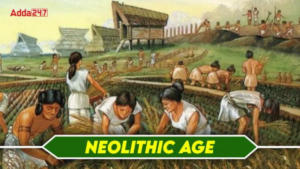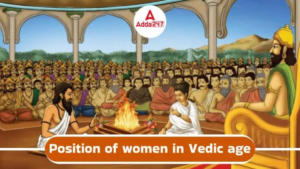Table of Contents
Established in 1875 by Swami Dayananda Saraswati in Bombay, Arya Samaj is a monotheistic Hindu reform movement combating casteism and advocating for widow remarriage and women’s empowerment. It aims to propagate monotheism through the authority of the Vedas, revitalizing Hinduism’s essence. Significant in the UPSC IAS Examination, Arya Samaj is explored in its historical background and socio-religious reforms, offering valuable insights for aspirants.
History of Arya Samaj
The Arya Samaj, a progressive Hindu faith and lifestyle, was founded in 1875 in Bombay (now Mumbai), India.
- Swami Dayanand Saraswati established the Arya Samaj to revitalize the wisdom of the Vedas, and the ancient Hindu scriptures and foster the overall well-being—social, spiritual, and physical—of humanity through various social movements.
- The term “Arya Samaj,” translating to “Noble Society” in Sanskrit, reflects its commitment to advocating for intercaste marriages, widow remarriages, women’s empowerment, and the eradication of practices like child marriage, Sati-Pratha, and polygamy among Hindus.
- Additionally, the Arya Samaj vehemently opposed the dominance of Brahmins, the rigid caste system, untouchability, and other societal injustices.
- The Arya Samaj not only contributed significantly to the reform of Indian society, addressing numerous social ills, but it also laid the foundation for the nation’s struggle for independence. Many members of the Arya Samaj actively participated in the freedom movement.
Mission of Arya Samaj
The Arya Samaj is primarily dedicated to disseminating Vedic knowledge and principles among the masses while striving to eradicate injustice (Anayay), ignorance (Agyan), and poverty (Abhav) from society.
- Swami Dayanand Saraswati envisioned a society where individuals are identified by their occupation rather than their caste, advocating for a casteless India devoid of discrimination.
- Education is another core mission of the Arya Samaj, and it stands as one of India’s foremost providers of education, offering programs from primary to graduate levels.
- The Samaj places significant emphasis on empowering and educating women, recognizing their vital role in society.
- Furthermore, the Samaj endeavours to facilitate the transformation of individuals into morally upright beings, aiming for dual progress—both spiritual and social upliftment.
Principle of Arya Samaj
The Arya Samaj advocated for the propagation of Vedic principles and teachings, with a focus on making Vedic literature and knowledge accessible to all. It pioneered efforts within Hindu organizations to promote conversion to its religious and ideological tenets. As its influence grew, the Samaj expanded its initiatives to include the establishment of orphanages, widows’ homes, schools, and colleges. Additionally, it actively promoted intercaste marriages, widow remarriages, and provided assistance during famines and medical crises. For the UPSC Exam, here are ten key principles (Niyams) of the Arya Samaj:
- God is the source of all true knowledge and everything knowable.
- God is formless, immortal, fearless, eternal, holy, and the creator of all.
- The Vedas hold the utmost authority as the source of true knowledge, and all Aryas must study, spread, hear, and preach them.
- Aryas must always be prepared to reject falsehoods and embrace truth.
- All actions should align with Dharma, considering what is right and wrong.
- The Arya Samaj aims to enhance spiritual, physical, and social well-being for all.
- Every action should be driven by love, righteousness, and justice.
- Avidya (ignorance) must be eradicated, and Vidya (knowledge) should be promoted.
- Individuals should not solely pursue their interests but should also seek opportunities to advance others’ interests.
- To foster universal welfare, individuals should adhere to societal rules while maintaining personal freedom.
Contribution of Arya Samaj
While Swami Dayananda Saraswati established the groundwork for the Arya Samaj, it was the collaborative endeavors of Swami Virajanand Dandeesha, Pandit Lekh Ram, and Shri Shraddhanand that enabled the Arya Samaj to connect with the broader population and spread the true teachings of Hinduism. Below are brief overviews of their roles and contributions.
Swami Virajanand Dandeesha:
- Virajanand Dandeesha, also known as the blind sage of Mathura, was a revered teacher of Arya Samaj founder Dayanand Saraswati.
- Born into a Brahmin family in Kartarpur, near Jalandhar, in 1778, he lost his sight due to smallpox at a young age, following the death of his father, who had instilled in him the fundamentals of Sanskrit.
- Influenced by Swami Purnanand’s teachings on the “arsha” Shastras and Sanskrit grammar, Virjanand began teaching and expanding his knowledge of Sanskrit literature.
- Dayanand, in his quest for a guru, met Virajanand, who played a pivotal role in shaping his spiritual journey.
Shri Shraddhanand:
- Also known as Mahatma Munshi Ram, Swami Shraddhanand was a revered Hindu saint and a fearless fighter in India’s struggle for freedom.
- Born into a Hindu Khatri family in Talwan (Jullundur) in 1856, he epitomized courage and sacrifice.
- Engaged in the divisions of Gurukul and DAV within the Arya Samaj, Shraddhanand became instrumental in these sections.
- Following the assassination of Lala Lekh Ram in 1897, Shraddhanand assumed his position and later became president of the Punjab Arya Pratinidhi Sabha, establishing its monthly journal, Arya Musafir.
- In 1917, he renounced worldly ties, adopting the name “Shradhanand,” and permanently relocated from Gurukul to Delhi.
Pandit Lekh Ram:
- Pandit Lekh Ram, a prolific writer and advocate for the Arya Samaj, was born in Saiyad Pur, Punjab, on the eighth day of Chaitra in 1915.
- Introduced to Maharshi Dayanand Saraswati and the Arya Samaj through the writings of Munshi Kanhaiya Lal Alakhdhari, he resigned from his government position to promote Arya Samaj’s ideals.
- He joined the Punjab Arya Pratinidhi Sabha as a preacher and founded the Arya Samaj in Peshawar.
- Lekh Ram also authored a paper titled Dharmopdesh, dedicated to spreading the principles of Arya Samaj and Vedic Dharma.
Swami Dayanand Saraswati
Swami Dayanand Saraswati, also known as Maharshi Dayanand, was a prominent Indian philosopher and social leader, born in 1824 in the village of Tankara, Morbi district, Gujarat, India.
- An eminent thinker and social reformer, Swami Dayananda Saraswati recognized the shackles of age-old customs, superstitions, and beliefs that bound Indian society in the nineteenth century.
- He fearlessly opposed various social ills including caste discrimination, gender inequality, religious dogma, and economic disparity, advocating for a society free from bigotry and oppression.
- Rejecting idol worship, he upheld the belief in a formless God, and to guide people towards a rational and progressive lifestyle, he championed the slogan “Back to the Vedas,” urging a return to the teachings of the ancient scriptures.
| Maharshi Dayanand Saraswati | |
| Born | 12 February 1824 |
| Place | Tankara, Morbi district of Gujarat, India |
| Childhood Name | Mool Shankar Tiwari |
| Founder of | Arya Samaj |
| Guru to Swami Dayanand Saraswati | Swami Virajanand Dandeesha |
| Arya Samaj’s initial headquarters | Bombay, India. |
| Literary works |
|
| Arya Samaj Motto | Krinvanto Vishwam Aryam, which means: “Make the World Noble |
| Died | 30 October 1883 |
Significance of Arya Samaj
- Arya Samaj mandates marriage age: Men – 25, Women – 16.
- Swami Dayananda humorously dubbed Hindus “the progeny of children.”
- Arya Samaj gained fame for humanitarian efforts post natural disasters.
- Arya Samaj pioneer in advancing education.
- After Dayananda’s passing in 1883, members continued work, with a focus on education.
- In 1886, Dayanand Anglo Vedic (D.A.V.) College established in Lahore.
- Arya Samaj boosts Hindu self-esteem and challenges white dominance and Western culture.
- Shuddhi (purification) movement was initiated to reintegrate Christians, and Muslims into Hindu culture.
- The Shuddhi movement fosters social interaction and sparks group political consciousness.
- Aim to convert untouchables, those outside the caste system into pure caste Hindus.
Social Reforms
Amidst the rise of Western education in India, Swami Dayanand Saraswati emphasized the importance of Vedic education. From 1869 to 1873, he launched a movement to revitalize traditional Hinduism, advocating for a resurgence in Vedic values through his rallying cry, “Return to the Vedas.”
- Swami Dayanand Saraswati established Gurukuls, also known as Vedic schools, which emphasized Vedic culture, values, and Truth (Satya).
- These Vedic schools aimed to break away from the British education system by offering separate education for boys and girls based on ancient Vedic principles.
- The formation of the Dayanand Anglo Vedic College Trust and Management Society (DAV), commonly referred to as DAV, three years after Swami Dayanand Saraswati’s demise, signalled the inception of the DAV movement, dedicated to crystallizing his social and educational ideologies.
- The first DAV High School was inaugurated in Lahore on June 1, 1886, with Lala Hans Raj (1864-1938) serving as its headmaster.
- Due to his exemplary qualities such as honesty, integrity, selflessness, visionary foresight, and wisdom, Hans Raj, recognized as the father of the DAV movement, earned the honorific title of Mahatma.
- Over its 125-year existence, DAV expanded its reach to encompass rural, urban, semi-urban, slum, and tribal areas across almost every state in India, except Kerala.
- In response to the growing demand for specialized education for women, Lala Devaraj established Kanya Mahavidyalaya in Jalandhar during the 1890s.
Religious Reforms
Arya Samaj holds the belief that God represents the ultimate power and the wellspring of all knowledge. Stemming from the teachings of Swami Dayanand Saraswati, the movement was sparked to safeguard the Aryan religion against colonial and Christian influences, aiming to restore its Vedic essence while purifying it from later distortions.
- Swami Dayananda advocated for adherence to dharma among Hindus, envisioning a society grounded in morality. He emphasized the importance of justice and truthfulness in speech, action, and thought, aligning with the virtues outlined in the Vedas.
- Through its efforts, Arya Samaj succeeded in bolstering Hindus’ confidence and self-esteem while mitigating the impact of Westernization on Hinduism.



 Bishnoi Movement - History, Objective, a...
Bishnoi Movement - History, Objective, a...
 Neolithic Age- Agriculture, Tools, Potte...
Neolithic Age- Agriculture, Tools, Potte...
 Position of Women in Vedic Age: Societie...
Position of Women in Vedic Age: Societie...
